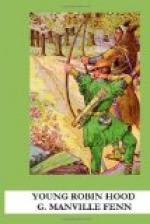Young Robin just saw two packages roll to the ground as the cob dashed off; then he was holding on with all his might to old David’s belt as the cob galloped away with half-a-dozen of the robbers trying to cut it off.
[Illustration: The stout cob dashed of at a gallop, with David holding on to the pommel.]
Then the little fellow felt that he was being jerked and knocked and bruised, as the horse tore along with David, head and neck stretched out. There was a rush under some low boughs, and another rush over a patch of brambles and tall bracken; then the cob made a bold dash at a dense mass of low growth, when there was a violent jerk as he made a bound, followed by a feeling as if the boy’s arms were being torn out at the shoulders, a rush through the air, a heavy blow, and a sensation of tearing, and all was, giddiness and pain.
CHAPTER II
It is not nice to be pitched by a man off a horse’s back on to the top of your head.
That is what young Robin thought as he sat up and rubbed the place, looking very rueful and sad.
But he did not seem to be entirely alone there in the dense forest, for there was another young robin, with large eyes and a speckled jacket, sitting upon a twig and watching him intently. Robin could think of nothing but himself, his aching head, and his scratches, some of which were bleeding.
Then he listened, and fancied that he heard shouting, with the trampling of mules and the breaking of twigs.
But he was giddy and puzzled, and after struggling through some undergrowth he sat down upon what looked like a green velvet cushion; but it was only the moss-covered root of a great beech tree, which covered him like a roof and made all soft and shady.
And now it was perfectly quiet, and it seemed restful after being shaken and jerked about on the horse’s back. Robin was tired too, and the dull, half-stupefied state of his brain stopped him from being startled by his strange position. His head ached though, and it seemed nice to rest it, and he stretched himself out on the moss and looked up through the leaves of the great tree, where he could see in one place the ruddy rays of the evening sun glowing, and then he could see nothing—think nothing.
Then he could think, though he still could not see, for it was very dark and silent and strange, and for some minutes he could not understand why he was out there on the moss instead of being in Aunt Hester’s house at Elton, or at home in Nottingham town.
But he understood it all at once, recollecting what had taken place, and for a time he felt very, very miserable. It was startling, too, when from close at hand someone seemed to begin questioning him strangely by calling out:
“Whoo-who-who-who?”
But at the end of a minute or two he knew it was an owl, and soon after he was fast asleep and did not think again till the sun was shining brightly, and he sat up waiting for old David to come and pull him up on the horse again.




